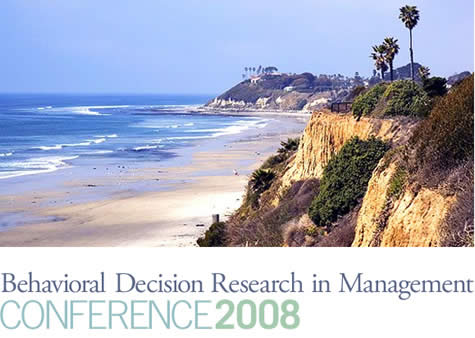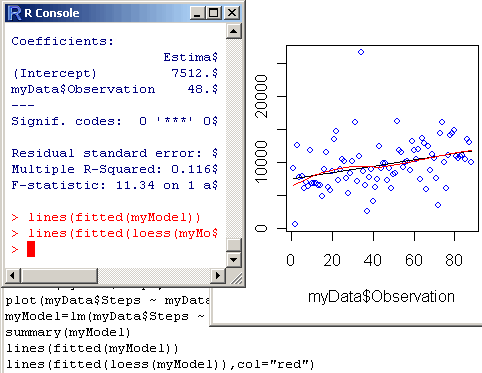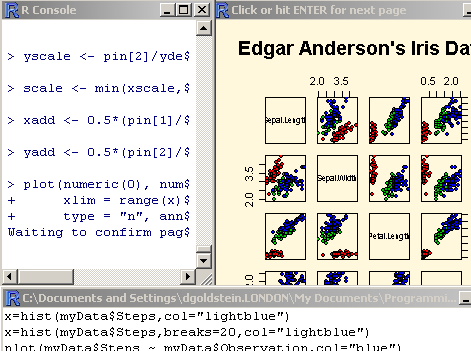SJDM ELECTS NEXT PRESIDENT AND EXECUTIVE BOARD MEMBER

The results of the Society for Judgment and Decision Making elections are in:
Though this suggests conspiracy, we will remind readers that a recent analysis of the SJDM member directory (p. 7) found the most common SJDM first name to be, you guessed it, Daniel.
At of the recent conference, Jon Baron handed over the presidency to Michael Birnbaum who will serve until Dan Ariely takes over in Fall 2008.
2008 SUMMER INSTITUTE IN INFORMED PATIENT CHOICE

Patients make decisions about a matter that is very important to them, their health. New findings on the representation of information can improve decision making, and new tools, such as the Distribution Builder put these findings to work. It is a bright new era of informed patient choice. This coming summer, try to catch Dartmouth’s summer institute on the topic.
Interprofessional Education in Decision Support
Dartmouth College, Hanover, NH, USA
June 25 – July 2, 2008
The Background Motivation for SIIPC 2008:
• Patient-centered care could be improved if the different members of multidisciplinary health care teams can work together in providing high-quality Decision Support /Patients’ Decision Aids (DS/PtDAs).
• Therefore, we need to develop, test, and implement effective, sustainable interprofessional training programs to teach DS/PtDAs as a clinical skill.
• To do this well, we need to build collaborative links between experts in DS / PtDAs and experts in inter-professional education.
The SIIPC 2008 Format:
Throughout the week, 12 Faculty & 70 selected Fellows will:
• Identify promising theories, methods, and outcomes evidence for designing educational programs for effective interprofessional training in the clinical practice of DS /PtDAs.
• Compare different models for implementing interprofessional clinical training programs in DS/PtDAs.
• Debate whether there’s a need to certify clinicians in the practice of DS/PtDAs, and, if so, identify the key principles for establishing a sustainable process for certification.
• Develop collaborative links among scientists who are prepared to investigate key basic and applied problems in the field of interprofessional education about the clinical practice of DS/DAs.
This discussion, debate, and exploration will take place in lectures, in small workgroups, and in interactive electronically-supported research “labs”.
Applying for a Summer Institute Fellowship
For application forms and information about the submission process, visit: http://www.dartmouth.edu/~cecs/cic/2008/index.html and click on “Applications”
The application deadline is January 15, 2008. Applicants’ submissions will be reviewed by the Planning Committee. Selected Fellows will be notified in April, 2008. Fellows will be provided with housing on the Dartmouth campus, some meals, and course materials.
Supported By:
The Center for Informed Choice at The Dartmouth Institute for Health Policy & Clinical Practice The Agency for Health Care Research and Quality.*
*Funding for this conference was made possible in part by 1R13HS017378-01 from the Agency for Healthcare Research and Quality (AHRQ). The views expressed in written conference materials or publications and by speakers and moderators do not necessarily reflect the official policies of the Department of Health and Human Services; nor does mention of trade names, commercial practices, or organizations imply endorsement by the U.S. Government.
OBHDP CALL FOR PAPERS: CONNECTING BIOLOGY AND BUSINESS

The journal Organizational Behavior and Human Decision Processes has always been a home for research in Judgment and Decision Making, and its editorial board comprises quite a few of its scholars. Guest editors Colin Camerer, Drazen Prelec, and Scott Shane are announcing an exciting call for papers on the biological bases of business.
“In recent years, researchers have begun to use biological methods to examine issues related to business. Studies have looked at such topics as the role of genetic factors in leadership, entrepreneurship, and job satisfaction; the role of neural circuits in purchasing decisions, investment behavior, and response to financial reward; the effect of hormones on occupational choice, managerial decisions, and risk taking; the physiological effects on employees of workplace stress, organizational reward systems, and leadership styles; and the biological basis of key managerial issues such as strategic responses in competitive situations; the drive for power; and reputation.
This research has generated some fascinating findings. For instance, we now know that there is a genetic component to leadership. We also know that different parts of the neural system are stimulated by immediate and delayed financial reward. And we know that hormones affect occupational choice. While these are only a few illustrative examples of what studies of the biological basis of business have taught us, most management researchers know little about these findings. Much of the research in this vein has been published in journals that management scholars do not routinely follow, and the different studies themselves have been isolated from one another, making it difficult to see the cumulative set of findings and their effect on management unless scholars systematically look for it. We believe that the time is right to bring the biological basis of business to the attention of the mainstream of the management research community.
Our goal in this special research forum is simple, but also broad. We seek to understand how human biology affects business-related behavior. Therefore, we invite papers that examine any aspect of this topic. Our aims are threefold:
• First, we aim to bring together research that examines how biological factors affect different areas of management from organization behavior to entrepreneurship to business strategy to financial decision making to marketing. We believe that the phenomenon orientation of management research often leads researchers examining similar theoretical issues in different areas of business study to fail to connect their work. By organizing a special issue around the theme of biology rather than around different business topics as is often the case in management research, we hope to bring together the findings in disparate areas in a way that illuminates the power of the theme.
• Second, we hope to link together research that takes fundamentally different approaches to examine the biological basis of business. For instance, we want to bring together researchers who conduct behavioral genetics studies with those examining the physiology of emotion and those who use brain imaging to examine brain imaging because we believe that by putting papers from these different perspectives together will help to stimulate thought about the connections between them. These connections are important, we believe, because a biological basis of business will ultimately need to collect all of these pieces into a coherent and related whole.
• Third, we seek to bring to the attention of the academic community in management the widespread research that has been conducted to examine the biological basis of business, both to introduce additional researchers to the methodologies used in this area, to show the important stylized facts that have been collected, and to demonstrate the evidence for theoretical arguments that have been amassed to date.
Because the domain of this research forum is very broad – the examination of any aspect of biology on any aspect of business – we expect that researchers will identify a number of research questions that we have not thought of. However, in the interest of suggesting ideas, prospective contributors may wish to consider (but are certainly not limited to) the following research questions: Is there a biological component to risk taking? If so, what is it? Do hormones affect occupational choice? If so, how? Are there physiological differences between entrepreneurs and/or managers and the rest of the population? If so, what are they? What parts of the brain are used to make different types of managerial decisions? How does brain function affect decisions in organizations? How do emotions affect decision making? What are the neural mechanisms that underlie key organizational issues such as conformity to authority, creativity and innovation, planning, among other things? What is the biological basis of such things as wishful thinking and organizational sense-making? How does brain function lead to anomalies in intertemporal choice? How does advertising tap brain circuitry for desire and reward? Is there a genetic basis for entrepreneurship, creativity and/or innovation? What are the physiological reactions to work environments and how do they affect organizational behavior? What are the physiological effects of different organizational reward mechanisms, such as money, recognition, and power? How do managerial actions affect hormone release? Are reputations, preferences for organizations, and organizational networks, among other things, encoded dopaminergenically? How does the neural system affect investment behavior?
Timeline
Submissions are due no later than june 30, 2008. The editors will select papers to be presented at a conference to take place at Case Western Reserve university on october 20-21, 2008 from among the submissions. The travel and accommodation expenses for one author will be paid for by the conference organizers. The papers presented at the conference will then go through the refereeing process. A subset of the papers presented at the conference will be published in a special issue of Organizational Behavior and Human Decision Processes.
For additional information
For additional information about the conference or special issue, please contact scott shane at scott.shane at case.edu, or 216-368-5538. Submissions should be sent electronically to Scott Shane.”
Photo credit: Center for the Study of Neuroeconomics at George Mason University
THE 2008 BEHAVIORAL DECISION RESEARCH IN MANAGEMENT CONFERENCE

Decision Science News very much enjoyed the last two BDRMs. The 2008 BDRM conference promises to be very good as well, as it is sponsored by the meteorically rising UCSD Rady School of Businsess, and familiar JDM names are running the show: Dave Schkade, Craig McKenzie, Uri Gneezy, and Alan Schwartz.
Call for Papers
The Decision Research Faculty at UC San Diego’s Rady School of Management invites submissions of papers, symposia, and posters for the 11th biennial conference on Behavioral Decision Research in Management. The conference will be held April 25-26, 2008, at the Rady School of Management’s new building overlooking the Pacific Ocean in La Jolla, California.
We encourage submissions of original research in all areas of behavioral decision research, especially as it applies to management and related disciplines. This includes, but is not limited to, consumer behavior, organizational behavior, negotiation, managerial decision making, behavioral finance, experimental and behavioral economics, decision analysis, behavioral strategy, behavioral operations research, behavioral accounting, and medical and legal decision making.
Paper submissions require 400-word (max) abstracts for review and 100-word abstracts for the program. Poster submissions require 100-word abstracts. Abstracts should be submitted electronically.
The submission deadline is January 18, 2008, with final decisions by late February.
PROFILE OF A PIONEER IN JUDGMENT AND DECISION MAKING

The following is extracted from a profile in the current American Psychologist written by Josh Klayman and Don Kleinmuntz: Klayman, J., & Kleinmuntz, D. N. (2007). Benjamin Kleinmuntz (1930 –2006). American Psychologist, 62(7), 698. (My father sent this my way. Growing up in Pittsburgh, I always thought of Ben Kleinmuntz as the dad of the family who lived across Forbes Avenue from us. As I moved into this field, his methods inspired mine, but before reading this profile, I did not appreciate just how central he was in shaping the field – Ed.)
In the 1960s, the idea that clinical judgments should be aided, or even replaced, by computerized algorithms was quite radical. Computerized interpretation of standardized tests is accepted now, although its role remains controversial. Benjamin Kleinmuntz was a pioneer in the study of computers in clinical reasoning and a founder of the field of judgment and decision research. He passed away at his home in Wilmette, Illinois, on June 28, 2006, at the age of 76.Ben was born in Cologne, Germany, in 1930 and, as a child, fled Nazi Germany with his family, settling in Brooklyn. He graduated from Brooklyn College in 1952 with a major in literature and was then drafted into the U.S. Army. Luckily for Ben, the Army decided that this college-educated native German speaker would best serve with a NATO intelligence unit located in a French chateau rather than on a Korean battlefield…
Ben’s early research concerned statistical methods for identifying psychopathologies and interpreting personality profiles. Frustrated in his initial attempts to secure a faculty position, he accepted a clinical position in the University of Nebraska counseling center. A year later he moved to the Carnegie Institute of Technology (now Carnegie-Mellon University), because the position included a part-time appointment in the Department of Psychology. There Ben met Allen Newell and Herbert Simon and found their work with computer simulations of problem solving and information processing to be very compatible with his own interests and inclinations.
Ben then focused on investigating the use of computers in clinical diagnosis. In 1963, he published an article in Science that demonstrated the superiority of computerized personality test interpretation, an idea that was distinctly cutting-edge at the time. He soon became a full-time faculty member in psychology and was promoted to full professor in 1967. With Newell and Simon, he organized the first three Carnegie Symposia on Cognition, an annual series that continues today. He edited three books of influential papers from those symposia. The third volume, Formal Representation of Human Judgment (1968), was particularly important to the field of judgment and decision-making research, anticipating many of the developments that launched that field in the 1970s….
In Chicago, Ben renewed his friendship with Hillel Einhorn, whom he first met when Einhorn visited Carnegie- Mellon in 1971. Einhorn had established the Center for Decision Research (CDR) at the University of Chicago. Ben encouraged his eldest son Don to work at the CDR and to join the doctoral program there. Don, Ben, and Hilly collaborated on a 1979 Psychological Review article, “Process Tracing and Regression Models of Judgment,” which integrated cognitive characterizations of decision processes a la Newell and Simon with statistical models of decision making in the tradition of Meehl. To Ben’s delight, he and Don eventually published three more papers together, and Don continued the family business in decision research and its applications.
During the 1980s, Ben (with his student, Julian Szucko) investigated polygraphic lie detection and became an outspoken critic of the method. In 1990, Ben published another article, “Why We Still Use Our Heads Instead of Formulas: Toward an Integrative Approach” (Psychological Bulletin), which synthesized the extensive research literature on statistical and intuitive judgment. Many of its themes remain central in judgment and decision research. As his friend and colleague Zur Shapira remarked, “The beauty of his work stems, among other things, from his effort to not criticize intuition, as many of his colleagues did and do, but rather to integrate it with formal approaches…”.
Filed in
Conferences
 Subscribe
Subscribe to Decision Science News by Email (one email per week, easy unsubscribe)
ACR 2007 MEMPHIS & JDM 2007 LONG BEACH

If you are interested in consumer decision making, two must-attend conferences are going down in the next 30 days: JDM (Society for Judgment and Decision Making) and ACR (Association for Consumer Research). Here is the skinny.

What: ACR 2007
aka: 2007 Association for Consumer Research Annual North American Conference
Conference Web Site
When: October 25-28, 2007
Where: Memphis, TN
Hotel:
The Peabody Hotel
149 Union Avenue
Memphis, TN 38103
Map: Here
Starving grad student transport: Matatransit (System map w/ airport)

What: JDM 2007
aka: Society for Judgment and Decision Making The 2007 28th Annual Conference
Conference Program
When: November 16-19, 2007
Where: Long Beach, CA
Hotel:
Westin Long Beach
333 E. Ocean Blvd.
Long Beach, CA 90802
(overflow hotel info)
Map: Here
Starving grad student transport: Long Beach Transit (System map w/ Airport)
Addendum: Some updated info from George Wu Nov 8th, 2007:
The JDM conference in Long Beach is almost here
(November 16-19).
A few quick notes about the conference.
1. Early registration was closed on October 31. However,
there is still late registration onsite.
2.. The final program has been posted on the website:
Click to access 2007-program.pdf
A hard copy will be included as part of your registration
package. On the other hand, if you would like to have
abstracts of posters, you need to download this information
for yourself:
Click to access 2007-posters.pdf
3. Information for poster and oral presenters has been
posted on the JDM website. If you are presenting,
make sure that you read this material:
Click to access 2007-paper-guidelines.pdf
Click to access poster-guidelines.pdf
4. Unfortunately, the main conference hotels are sold out.
There are other hotels available for those who have not
made arrangements yet. see the JDM website for more
information:
http://www.sjdm.org/
I look forward to seeing as many of you as possible
in Long Beach!
George Wu
Program Chair
2007 JDM Conference, Long Beach
Filed in
Gossip
 Subscribe
Subscribe to Decision Science News by Email (one email per week, easy unsubscribe)
PSYCHOLOGISTS ON ECONOMISTS AND ECONOMIC BEHAVIOR

There’s an interesting exchange on the SJDM mailing list. It started with a query:
I agreed to give a talk to the University Economics Society here next week with the title: “Why Psychologists know more about Economic Behaviour than Economists”. Any suggestions JDMers might have would be interesting.
and led to a flurry of responses. Some choice quotes:
You could exploit an inadvertent ambiguity in your talk title, and claim that you meant that psychologists know more about economic behaviour than they do about economists. Indeed, economists are mysterious beings. Many persevere in the belief that people must behave optimally, at least on average, and they seem perpetually baffled by basic psychological phenomena that seem completely intuitive to one’s proverbial grandparent. I feel that psychologists indeed understand them quite poorly.
Perhaps the core argument is that we [Psychologists] go out and look at the animals (at least now and then) while the economists very rarely do.
The answer seems to be quite simple. Economists are bound to the ‘rational model’ whereas psychologists are not.
What economists think about psychologists:
1. Psychologists only study rats, pigeons, college freshman, and crazy people.
2. (Perhaps due to the above,) psychologists are not very rational.
What psychologists think about economists:
1. Economists stubbornly hold to a rational model of man(kind) that (they must know) is obviously wrong.
2. Economists can never agree about what will happen to our economy.
One reason psychologists know more about behavior than economists is that they are interested in the mental processes that underlie it, whereas economists tend not to care about about the workings of the black-box between our ears, preferring to remain agnostic about these issues. In this way they are like behaviorists, as more than a few (non-behaviorist) psychologists have pointed out. With a self- imposed constraint to only study behavior, it seems doubtful that they will be able to ever hold the upper-hand in understanding any behavior.
Amos Tversky told me about a discussion he had with a group of economists at a conference where Danny Kahneman presented some of their empirical work demonstrating systematic inconsistencies in choice behavior. A small group of economists were intrigued by the findings but claimed that they were not true and would disappear at the aggregate level, under proper incentives, etc. The discussion continued over dinner with no resolution and Amos suggested a change of topic. He asked the economists whether president Carter’s economic policy and their spouses’ shopping behavior were rational. The response was negative. Amos* noted: ‘After a few more questions, it dawned on the participants that despite their commitment to universal rationality, they were denying the rationality of any particular individual, such as the President or the economist’s spouse.’
*Tversky, A. (1982). “Remarks on the study of decision making.” In G. Ungson and D. Braunstein: _Decision Making: An Interdisciplinary Inquiry_. Boston: Kent Publishing Co.
Economics, Psychology…Decision Science News only wishes to observe that this makes for some fine Sociology. It also wonders what multi-disciplinary folks like Gelman think (Addendum: my wish answered. Addendum 2: Some spirited commenting at Economist’s View).
Photo credits: http://www.flickr.com/photo_zoom.gne?id=1607234278&size=s & http://www.flickr.com/photo_zoom.gne?id=1018906077&size=s
Filed in
Jobs
 Subscribe
Subscribe to Decision Science News by Email (one email per week, easy unsubscribe)
WHARTON / BROWN / CORNELL / PRINCETON / HARVARD HIRING

If you like ivy and decision-making, it may be a good time to dust off your CV. Decision Science News has new announcements from Wharton and Brown this week, and links to previous posts at Cornell, Princeton, and Harvard.
I. Wharton
The OPIM Department at the Wharton School is home to faculty with a diverse set of interests in decision-making, information technology, information strategy, operations management, and operations research. We are seeking applications for tenure-track positions starting in the 2008-2009 academic year.
Applicants must have the potential for excellence in research and teaching in the OPIM Department’s areas of concern. Rank is open. Ph.D. is required.
Applications consisting of PDF files with
(i) a one-page cover letter
(ii) a resume or CV
(iii) at least one research paper
(iv) three contacts for letters of recommendation
(v) a list of any upcoming conferences at which you plan to present your work
should be entered at http://opim.wharton.upenn.edu/home/recruiting.html
The department will begin reviewing applications on November 15, 2007. To ensure full consideration, materials should be received by November 15th, but applications will continue to be reviewed until appointments are made.
The University of Pennsylvania is an Equal Opportunity Employer. Minorities, females, individuals with disabilities, and veterans are encouraged to apply.
II. Brown
SENIOR POSITIONS IN SOCIAL PSYCHOLOGY AND HUMAN MEMORY/ATTENTION
Department of Psychology, Brown University
The Department of Psychology at Brown University anticipates making
several new hires over the next three years to develop areas of
strength in Social Psychology and Human Memory/Attention. As the
first step in this effort, the Department is currently seeking Senior
Level (Associate or Full Professor) applicants for positions in each
of these areas.
For the social psychology position, we are particularly interested in
applicants whose research interests focus on social cognition and
whose work makes contact with one or more of the following areas:
judgment and decision making, evolutionary psychology and ecological
bases for social reasoning, game theory and strategic interaction.
Applications should be submitted to Prof. Joachim Krueger, Chair of
the Social Psychology Search Committee.
The research focus for the human memory/attention position is open,
and applicants utilizing purely behavioral, computational, or
cognitive neuroscience (e.g., EEG, fMRI) approaches will all be
considered. Applications should be submitted to Prof. William
Heindel, Chair of the Human Memory/Attention Search Committee.
Brown has a highly interactive research environment in the behavioral
and brain sciences, including the Department of Cognitive &
Linguistic Sciences, the multidisciplinary Brain Science Program, and
the new neuroimaging facility. We expect successful candidates for
both positions to have proven records of (1) excellence in research,
(2) the ability to obtain research funding, and (3) contributions to
undergraduate and graduate teaching and mentoring. Interested
applicants should submit a curriculum vitae, copies of reprints and
preprints of publications, a statement of research and teaching
interests, and the names of five referees to the Chair of the
appropriate search committee, Department of Psychology, Brown
University, Box 1853, Providence RI 02912. Applications received by
December 15, 2007 will receive full consideration. Brown University
is an equal opportunity/affirmative action employer. Minorities and
women are especially encouraged to apply.
III. Several Cornell jobs are advertised in the current SJDM newsletter.
IV. The Princeton post on Decision Science News
V. The Harvard post on Decision Science News
Photo credit: http://www.flickr.com/photo_zoom.gne?id=1527452820&size=m
READ TEXT FILES, RUN MODELS

The Decision Science News R video tutorials continue with number 2. (If you missed that last one, you will want to watch R Video Tutorial Number 1 first.) The Goldstein pedometer dataset can be downloaded from http://www.dangoldstein.com/flash/Rtutorial2/pedometer.csv
High Res Version: http://www.dangoldstein.com/flash/Rtutorial2/Rtutorial2.html
Topics covered this week include:
- Tricking R into starting in your working directory
- Reading in text files
- Accessing columns in data frames
- Creating histograms
- Side effects and optional parameters of function calls
- Fitting simple linear models
- Adding least-squares and loess lines to plots
The commands in the tutorial are:
myData=read.table("pedometer.csv", header=TRUE, sep=",")
x=hist(myData$Steps,col="lightblue")
x=hist(myData$Steps,breaks=20,col="lightblue")
plot(myData$Steps ~ myData$Observation,col="blue")
myModel=lm(myData$Steps ~ myData$Observation)
summary(myModel)
lines(fitted(myModel))
lines(fitted(loess(myModel)),col="red")
Can’t view flash? Download movie If you see no image under Windows, download the TSSC Codec.
LEARN R BY JUST WATCHING

For this week, Decision Science News has created a video tutorial on how to get started using the R Language for Statistical Computing. (The tutorial is best viewed in your browser’s full-screen mode, try pressing F11 in Windows). R is free and open source, and constantly being improved upon by countless contributors worldwide. DSN highly recommends using R.
Hi Res Version at: http://www.dangoldstein.com/flash/Rtutorial1/Rtutorial1.html
Topics covered include:
- Downloading and installing R in Windows
- The R graphical user interface
- Viewing the graphics demo
- Vectors and basic stats
- Simple plotting
The commands in the tutorial are:
demo(graphics)
x=c(1,2,3,4,5,6,7)
y=c(10,14,20,18,16,15,10)
x+y
z=c(x,y)
sum(y)
mean(y)
sd(y)
plot(x,y)
barplot(y,col=”lightgreen”)
Got that? Now try R video tutorial 2
See also The R Graph Gallery
Can’t view flash? Download movie. If you see no image under Windows, download the TSSC Codec.
 Subscribe to Decision Science News by Email (one email per week, easy unsubscribe)
Subscribe to Decision Science News by Email (one email per week, easy unsubscribe)












